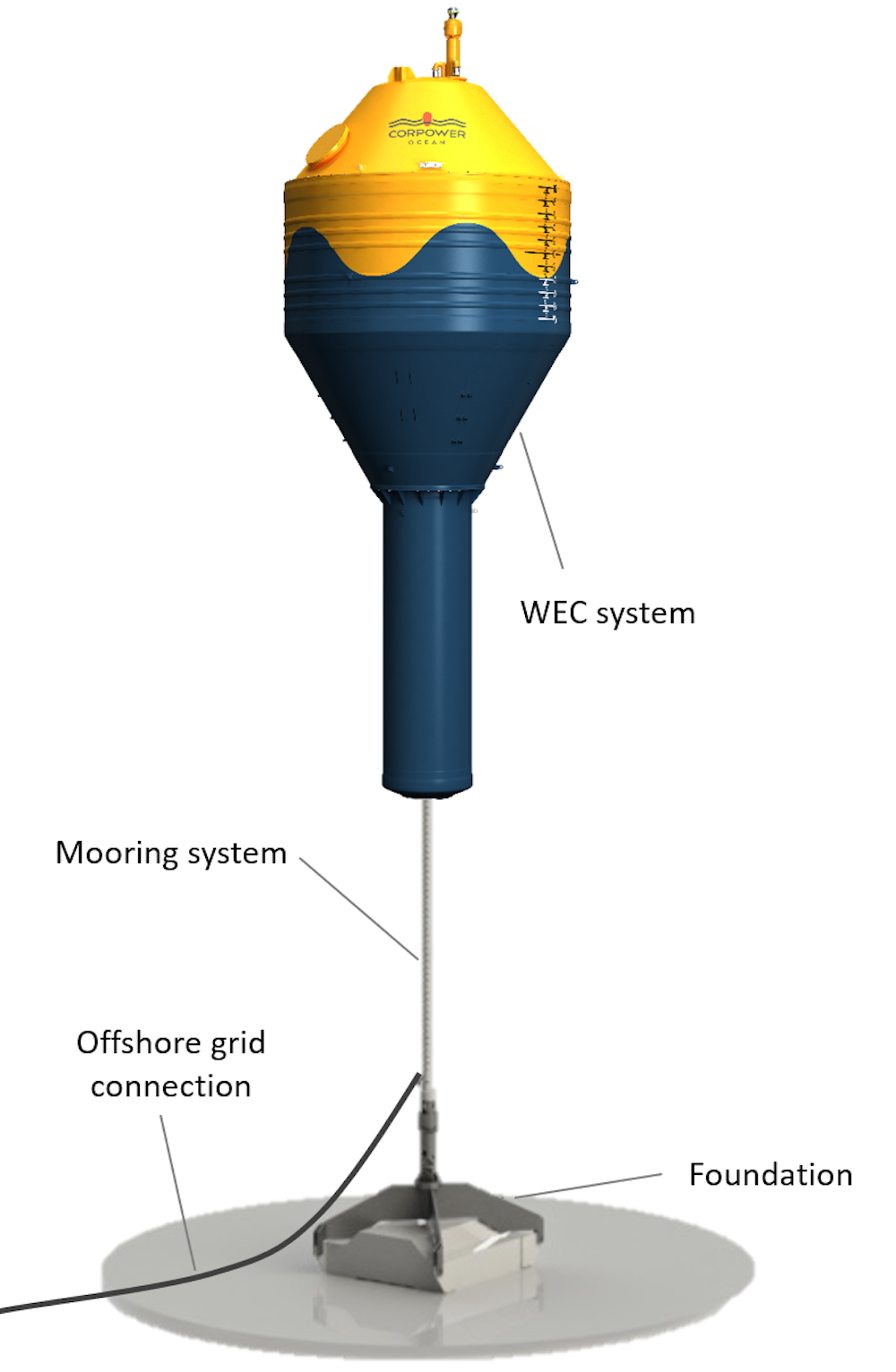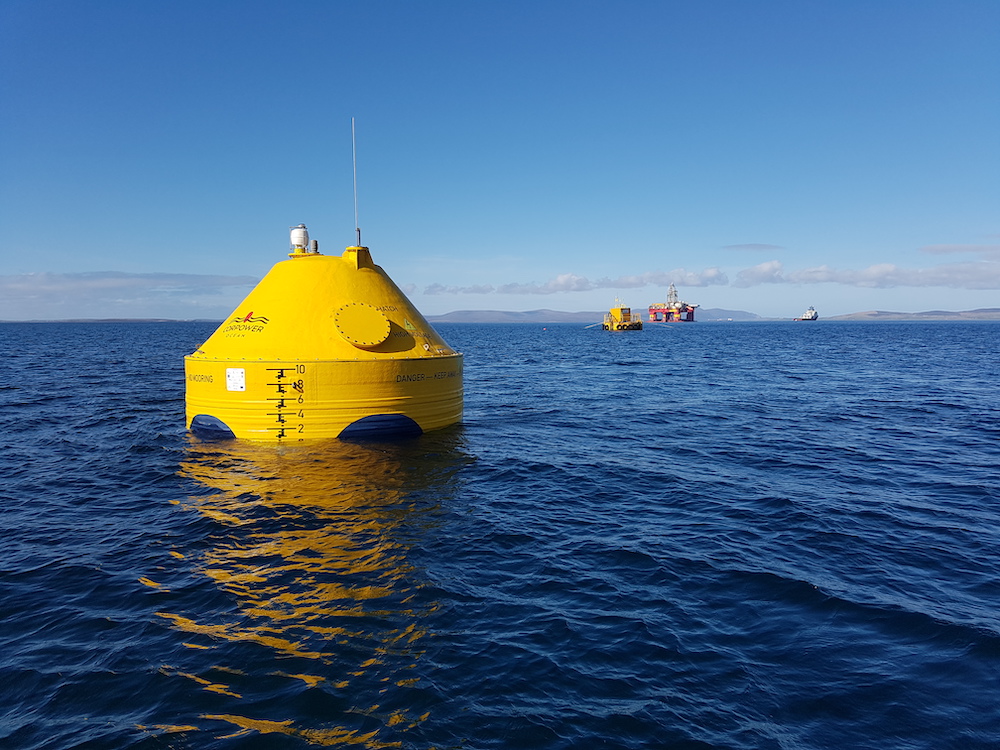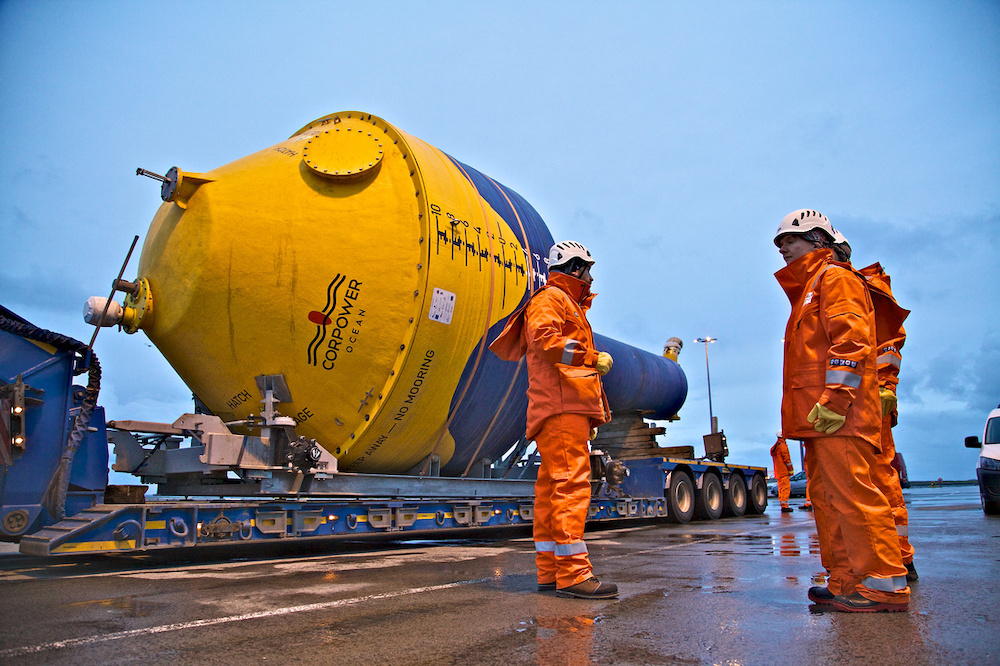
Led by CorPower Ocean, the WaveBoost consortium designed and developed an advanced power take-off (PTO) system allowing wave energy converters (WECs) to operate safer and more reliably in harsh ocean conditions while increasing annual electricity production by 27%.
The system incorporates a revolutionary pneumatic module that has 80% fewer components, reducing complexity and CAPEX while improving reliability, compared to previous designs.
An energy redistribution system manages fluctuating power input from ocean waves to support grid integration and increase energy production.
WaveBoost performance improvements
On the performance side, new dynamic seals were designed and tested resulting in 70% improvement in friction, while flow losses have been reduced by up to 90% compared to the previous product.
The improvements enabled the levelised cost of energy (LCOE) to drop by 18-29%, with operational expenditure expected to decrease by up to 30%.
Lifecycle analysis undertaken on a theoretical 50 megawatt (MW) array deployed in Scotland indicated a carbon intensity already as low as 31.4 gCO2e/kWh based on the first prototype WEC generation design alone.
This carbon intensity is comparable with other renewable technologies today and is more than 10 times less than conventional gas turbines, securing the pathway to low carbon intensity WEC technology.
The learnings from the WaveBoost project will be carried forward as CorPower Ocean move towards the manufacturing, dry testing and deployment of their next full-scale C4 WEC.

Addressing challenges in wave energy
Two key challenges associated with harnessing wave energy are addressed by WaveBoost:
Storm survivability
Reliable and efficient damping of wave energy devices is critical for robust operation in adverse weather conditions. Innovative machine elements will be demonstrated that in all operational conditions, including operation with faults, can provide safety and control of the machine.
This effort aims at eliminating the risk of end-stop impacts, which has been a significant cause for failure in previous wave devices and can be a driver of large and costly structures.
Fluctuating power input from ocean waves
Solutions to smoothen power variability by innovative load shedding will be demonstrated aiming to improve the overall efficiency and economics of direct drivetrains.

WaveBoost objectives
This project’s main objective was to improve the reliability and performance of PTOs by developing and validating a revolutionary braking module with advanced control that can be coupled to different types of WECs.
The WaveBoost module incorporates safety logic and energy redistribution functions beyond that of previous PTOs.
The specific project objectives and outcomes are:
- Increase reliability and survivability of WECs
- Increase performance and reduce cost of WECs
- Improve grid integration of wave energy
- Increase system technology readiness
- Reduce the lifecycle environmental impact.
Key outputs from the project include:
- The design of the WaveBoost module is technology-neutral, to be applicable to a wide range of WECs representing potentially more than 75% of the current market, hence its successful demonstration provides multiple opportunities for commercialisation to impact the entire wave sector
- Design of the advanced PTO, including an advanced braking system for greater control of movement and a 98% reduction on overall flow losses
- Development of HIL-rig and test plans for the advanced PTO
- FMECA and VMEA analysis of advanced PTO informing design and testing processes
- Detailed modelling of advanced PTO within multiple wave energy applications
- Accelerated testing of seals within a bespoke, state-of-the-art Seal Test Rig, resulting in a 70% improvement on seal friction
- Biofouling and corrosion testing in a real sea environment.
- Estimated 21.3% to 26.9% improvement in Annual Electricity Production (AEP), based on a target power matrix
- LCOE analysis undertaken of three array sizes; 50MW, 300MW and 1GW. Estimated 18.0% to 29.3% reduction in LCOE
- Lifecycle analysis undertaken of a 50MW array deployed in Scotland, resulting in a carbon intensity of 31.4gCO2e/kWh, comparable with other renewable technologies and more than 10 times less than conventional gas turbines
- Socioeconomic analysis undertaken of a 50MW array deployed in Scotland, resulting in €166M GVA and 2088 job years supported.

Taking the learnings forward
The learnings from the WaveBoost project have been carried forward as CorPower Ocean move towards the manufacturing, dry testing and deployment of their next full-scale C4 WEC.
Matt Dickson, Waveboost Project Manager, and Technical Project Manager at CorPower Ocean said: “CorPower has a rigorous product verification strategy that follows a structured five-stage process, established as best practice for ocean energy technology by International Energy Agency-OES, ETIP Ocean and Wave Energy Scotland.
“It involves step-wise validation of survivability, performance, reliability and economics starting with small scale prototypes in Stage 1, continued by sub-system testing and then fully integrated WEC in increasing scales up to array demonstration in Stage 5.
“The successful completion of the H2020 Waveboost project marks a key milestone in our journey and unlocks our progress from Stage 3 into Stage 4 of our program as we scale our WEC technology to full scale.”
The WaveBoost project consortium composed of sector leaders from Sweden, Portugal and the UK including CorPower Ocean (project lead), Arcos Hydraulik, the Research Institute of Sweden (RISE), EDP Innovação, WavEC Offshore Renewables, The University of Edinburgh, and the European Marine Energy Centre (EMEC).






